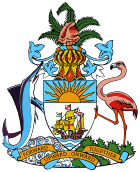
The Bahamas, known officially as the Commonwealth of The Bahamas, is a country within the Lucayan Archipelago. The archipelagic state consists of more than 700 islands, cays, and islets in the Atlantic Ocean, and is located north of Cuba and Hispaniola, northwest of the Turks and Caicos Islands, southeast of the U.S. state of Florida, and east of the Florida Keys. The capital is Nassau on the island of New Providence. The designation of "the Bahamas" can refer either to the country or to the larger island chain that it shares with the Turks and Caicos Islands. The Royal Bahamas Defence Force describes the Bahamas territory as encompassing 470,000 km2 (180,000 sq mi) of ocean space.
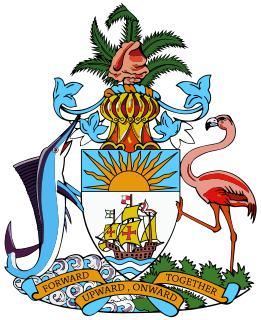
The Bahamas is a parliamentary constitutional monarchy headed by Queen Elizabeth II in her role as Queen of the Bahamas. The politics of the Bahamas takes place within a framework of parliamentary democracy, with a Prime Minister as the head of government. The Bahamas is an independent country and a member of the Commonwealth of Nations. As a former British colony, its political and legal traditions closely follow those of the United Kingdom. Queen Elizabeth II is the head of state, but executive power is exercised by the cabinet. Legislative power is vested in the two chambers of parliament. The Judiciary is independent of the executive and the legislature and jurisprudence is based on English common law. The multi-party system is dominated by the Progressive Liberal Party and the Free National Movement. The constitution protects freedom of speech, press, worship, movement, and association.
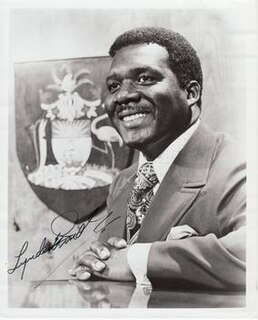
The Right Excellent Sir Lynden Oscar Pindling, is regarded as the "Father of the Nation" of the Bahamas, having led it to majority rule on 10 January 1967 and to independence on 10 July 1973. He served as the first black premier of the Colony of the Bahama Islands from 1967 to 1969 and as Prime Minister of the Bahamas from 1969 to 1992. He was leader of the Progressive Liberal Party (PLP) from 1956 to 1997 when he resigned from public life under scandal.

Perry Gladstone Christie, PC, MP, is a Bahamian former politician who served as Prime Minister of the Bahamas from 2002 to 2007 and from 2012 to 2017. He is the longest-serving Bahamian elected parliamentarian, representing the Centreville constituency from 1977 to 2017. He is also a former athlete. His Progressive Liberal Party is the oldest Bahamian political party, holding solid majorities in the Bahamian Parliament several times in its long history.

The Progressive Liberal Party is a populist and social liberal party in the Bahamas. The PLP lies on the centre-left of the political spectrum. Philip "Brave" Davis is the leader of the party after Perry Christie lost his bid for re-election as a representative in the 2017 election.

The national flag of the Bahamas consists of a black triangle situated at the hoist with three horizontal bands: aquamarine, gold and aquamarine. Adopted in 1973 to replace the British Blue Ensign defaced with the emblem of the Crown Colony of the Bahama Islands, it has been the flag of the Commonwealth of the Bahamas since the country gained independence that year. The design of the present flag incorporated the elements of various submissions made in a national contest for a new flag prior to independence.

Local government in the Bahamas exists in two forms, namely second-schedule and third-schedule district councils. There are a total of 32 local government districts: 13 second-schedule districts, which are further sub-divided into town areas, and 19 third-schedule districts, which are all unitary authorities. The second and third schedules together make up the first schedule. Local government policy is formulated and administered by the Department of Lands and Local Government through the Office of the Prime Minister. The day-to-day policy handling of the portfolio falls to the Minister of Local Government who also is empowered to create new local government areas from time to time based on demographics. The administrative and financial management is overseen by the ministry’s permanent secretary.

The Abaco Islands lie in the northern Bahamas 180 miles (290 km) east of South Florida. They comprise the main islands of Great Abaco and Little Abaco, along with smaller barrier cays. The northernmost are Walker's Cay, and its sister island Grand Cay. To the south, the next inhabited islands are Spanish Cay and Green Turtle Cay, with its settlement of New Plymouth, Great Guana Cay, private Scotland Cay, Man-O-War Cay, and Elbow Cay, with its settlement of Hope Town. Southernmost are Tilloo Cay and Lubbers Quarters. Another of note off Abaco's western shore is onetime Gorda Cay, now a Disney Island and cruise ship stop and renamed Castaway Cay. Also in the vicinity is Moore's Island. On the Big Island of Abaco is Marsh Harbour, the Abacos' commercial hub and the Bahamas' third largest city, plus the resort area of Treasure Cay. Both have airports. A few mainland settlements of significance are Coopers Town and Fox Town in the north and Cherokee and Sandy Point in the south. Administratively, the Abaco Islands constitute seven of the 31 Local Government Districts of the Bahamas: Grand Cay, North Abaco, Green Turtle Cay, Central Abaco, South Abaco, Moore's Island, and Hope Town.

Elections in the Bahamas take place in the framework of a parliamentary democracy. Since independence voter turnout has been generally high in national elections, with a low of 87.9% in 1987 and a high of 98.5% in 1997. The current Prime Minister is the Hon Hubert Minnis.

The Parliament of The Bahamas is the bicameral national parliament of Commonwealth of The Bahamas. The parliament is formally made up of the Queen, an appointed Senate, and an elected House of Assembly. It currently sits at Nassau, the national capital.
The Bahamas national rugby union team represent the Bahamas in the sport of rugby union. The team have thus far not qualified for a Rugby World Cup, but have participated in qualifying tournament. The nation is classified as tier three by the International Rugby Board (IRB).

General elections were held in the Bahamas on 2 May 2007.

General elections were held in the Bahamas on 2 May 2002. The opposition Progressive Liberal Party (PLP) won 29 of the 40 seats in the House of Assembly to defeat the governing Free National Movement (FNM). Voter turnout was 90.2%.
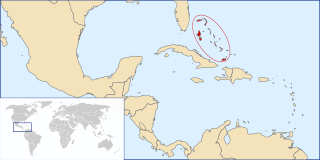
The following is an alphabetical list of topics related to the Commonwealth of the Bahamas.

General elections were held in the Bahamas on 26 November 1962, the first under universal suffrage. Whilst the Progressive Liberal Party won the most votes, the United Bahamian Party won the most seats, largely as a result of gerrymandering.

A general election was held in the Bahamas on 7 May 2012. Elections in the Bahamas take place in the framework of a parliamentary democracy, which relies on the first past the post system of voting. This was the first general election in which a third party offered a full slate of candidates along with the two major parties. The opposition Progressive Liberal Party (PLP) won a majority in the election making Perry Christie prime minister.

Dr. Hubert Alexander Minnis is the Bahamian Prime Minister since May 2017. Minnis is the leader of the Free National Movement, the present governing party, and the Member of Parliament for the New Providence constituency of Killarney. First elected to the legislature in the 2007 election, he succeeded Hubert Ingraham as party leader following the party's defeat in the 2012 election.
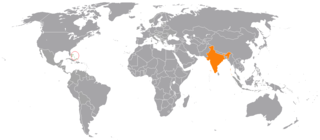
The Bahamas–India relations refers to the international relations that exist between The Bahamas and India. The Bahamas maintains an Honorary Consulate in New Delhi. The High Commission of India in Kingston, Jamaica concurrently accredited to The Bahamas. India does not have a resident diplomatic mission in The Bahamas.
